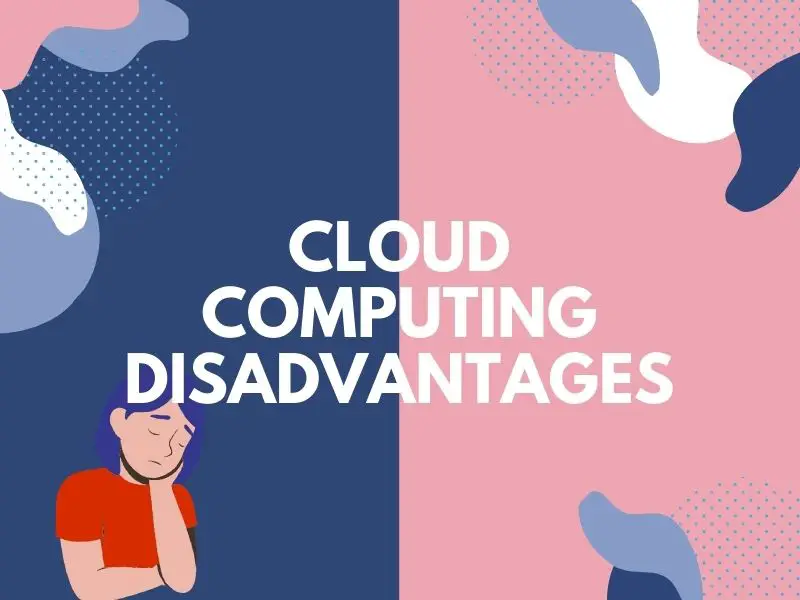Cloud computing has many advantages, but What are Some Cloud Computing Disadvantages that you should consider before making the switch? Understanding cloud computing disadvantages can help you determine if it’s the right choice for your business.
Security Risks
When considering the cloud, it is essential to consider the various security risks associated with it. Data loss can occur when companies move their data to the cloud, and compliance issues can arise if the cloud provider doesn’t meet the required standards. Additionally, users may experience limited customization options and have to share computing resources with other companies. As a result, cost overruns may occur due to these shared resources.
Network complexity can also be an issue as multiple networks must be connected for the system to work properly. Access control concerns exist due to the inability of a company to manage user access levels within its network. Furthermore, privacy violations may occur as data stored in the cloud is accessible by other users on the same system.
Lack of Control
One of the biggest drawbacks of cloud computing is a lack of control. This can be an issue in terms of security, as well as review. When it comes to security, cloud computing users must rely on the provider to protect their data. Users are not able to directly control the security measures in place, leaving them vulnerable to attack. Additionally, when some reviews or changes need to be made with the provider's software or services, users cannot make those changes themselves they must wait for the provider to review and implement them. Read unbiased Course reviews.
For those who enjoy having a high level of control and customization over their applications and services, cloud computing may not be ideal. However, for those who are comfortable ceding control and trusting a third-party provider with their data security and application updates, cloud computing can offer a lot of advantages such as scalability, cost savings, and more. Ultimately if you’re looking for more control over all aspects of your applications and services then you should consider other options such as on-premise solutions or hosted servers.
Limited Flexibility and Scalability
Limited flexibility, scalability constraints, difficulty customizing applications, resource availability issues and compatibility challenges can all play a role in the effectiveness of your cloud performance.
When it comes to flexibility, the cloud can struggle to tailor applications to your specific needs. This can make adapting existing software more difficult. Likewise, scalability constraints can mean that the more you use the cloud, the more strain will be placed upon its resources – something which is particularly noticeable during peak times.
The sheer variety of operating systems that are used across different devices poses a significant challenge to compatibility. In addition to this, if insufficient resources are available then data access may be interrupted or slow down as a result. On top of this, security concerns should always be taken into consideration when using a public or shared cloud service – such as those provided by third-party vendors.Check Profesional Courses.
Finally, the cost of both implementing and maintaining the cloud can vary wildly depending on your needs. Unpredictable service performance may also make it hard to accurately plan long-term projects or tasks. All of these factors must be weighed up against each other before committing to any type of cloud computing solution for your business.
Technical Limitations
Lack of control over data security, internet connectivity issues, and resource limitations can all be roadblocks when using cloud computing for your business. Bandwidth problems can also be an issue, particularly if you are expecting a large number of users to access the same data at once. In addition, compatibility can be an issue as certain applications may not work properly on the cloud platform or require additional hardware or software installations.
Maintenance requirements must also be considered when deciding on a cloud storage option as fixing any problems that arise could take up valuable time and money. Furthermore, you are almost always dependent on your provider for any updates or support services. Lastly, it is critical to thoroughly review all policies involved in using the cloud solution you choose as this will help ensure that there are no unexpected issues down the road.
Unreliable Connectivity
Network Instability – The first disadvantage of using cloud computing is network instability. Whenever you use a cloud service provider, you must rely on their service for reliable connection and data transfer. In some cases, the provider may not be able to deliver their promise due to limited hardware or software.
Latency Impact – Another cloud computing disadvantage is latency impact. This means that there may be delays in data transmission when working with a cloud provider due to unstable networks or slow service speeds. As such, it’s important to evaluate the providers carefully before committing to one and make sure that they can provide the bandwidth needed to meet your needs.
Analytics Jobs
Cost Effectiveness – Cost is another issue when considering cloud computing's advantages and disadvantages. It can be expensive to set up the infrastructure required for cloud services, especially when compared to managing an in-house system yourself.
Reliability & Availability Challenges – Reliability and availability are major issues with any type of technology and that includes cloud services as well. In some cases, outages may be unavoidable due to server maintenance or other factors outside of your control which can







